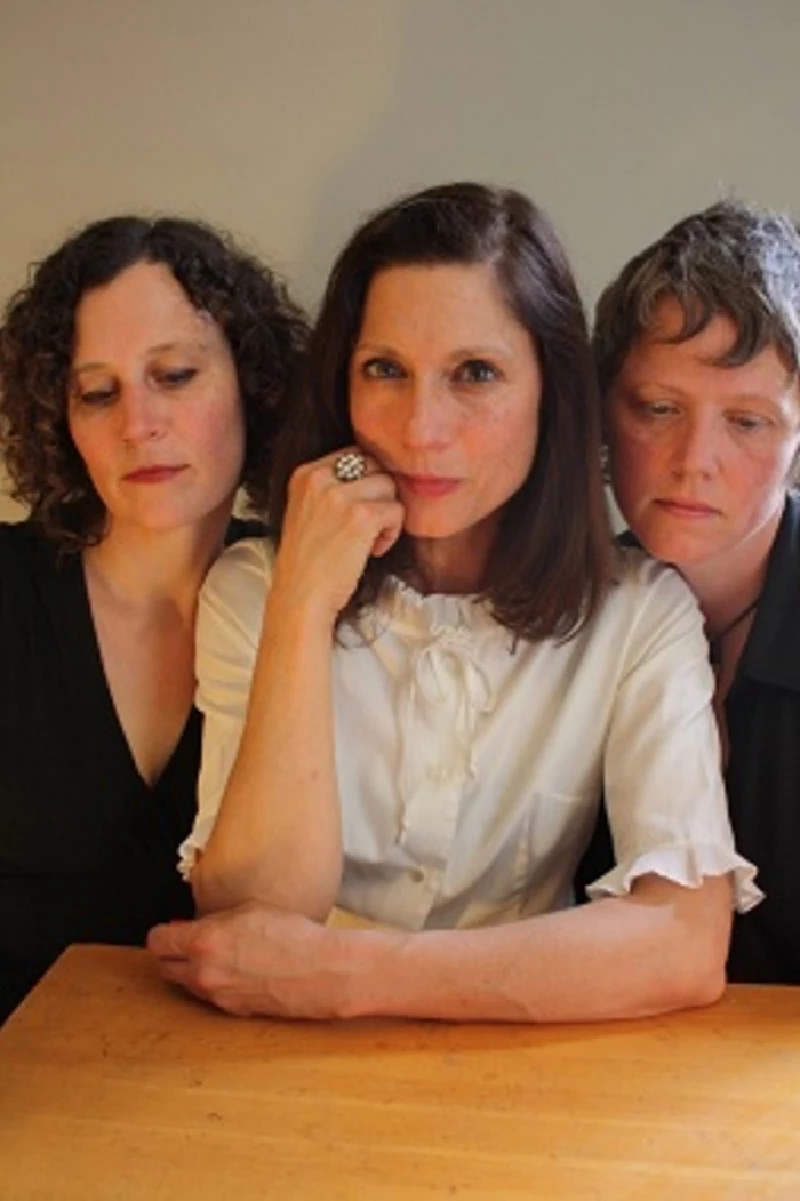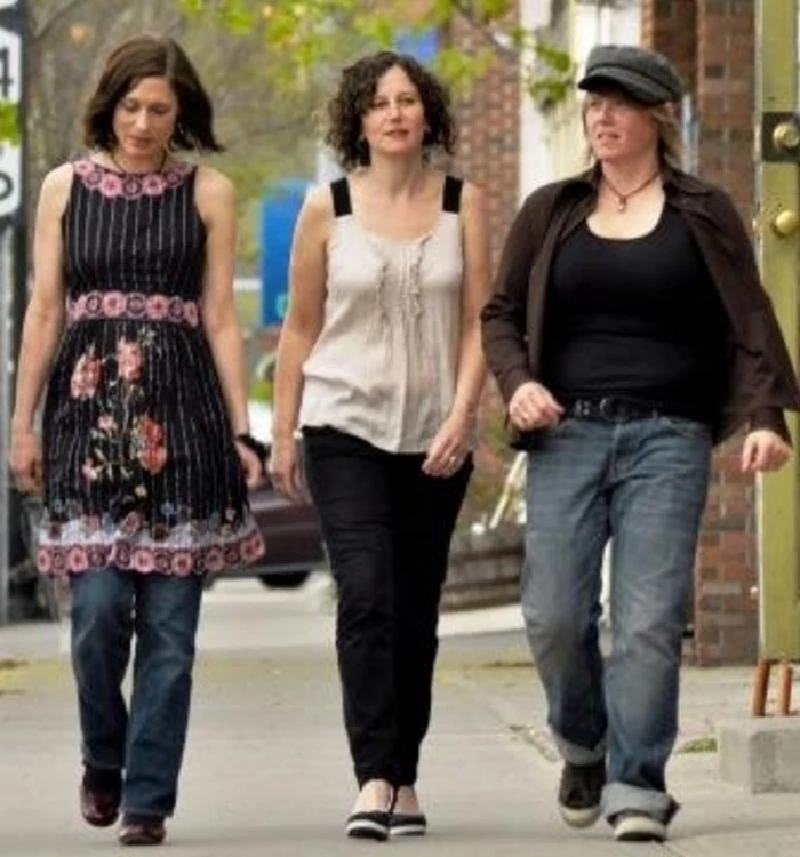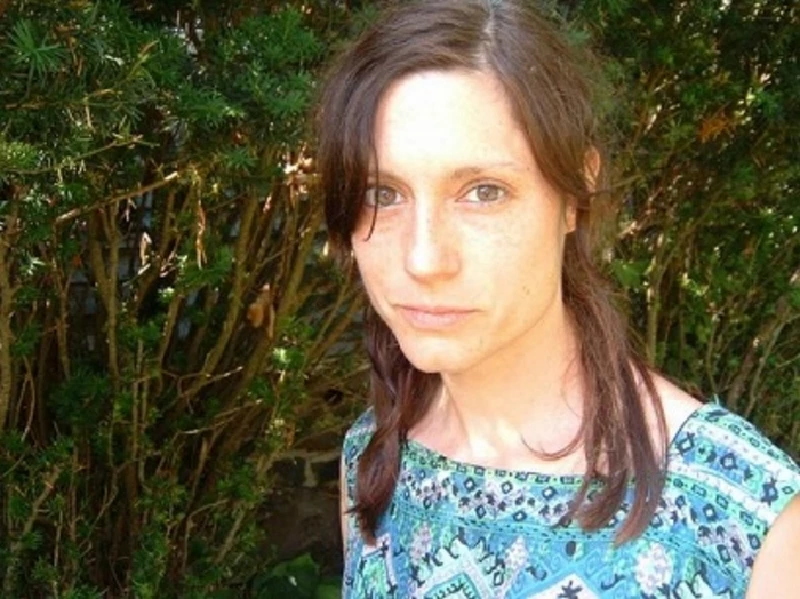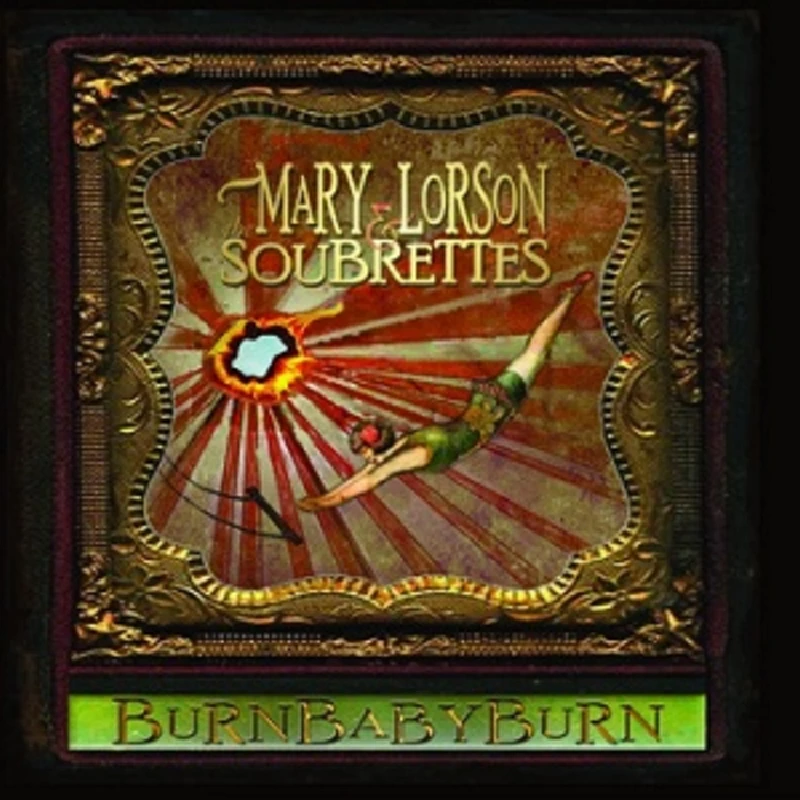Mary Lorson - Interview
by John Clarkson
published: 15 / 1 / 2012

intro
Mary Lorson, the former front woman with Madder Rose and Saint Low, speaks to John Clarkson about 'BurnBabyBurn', her debut album with her new band the Soubrettes, which examines the life of outlandish early vaudeville star, Eva Tanguay
An outlandish self-publicist, Eva Tanguay, whose life was as colourful off the stage as it was on it, billed herself as “the girl who made vaudeville famous.” The Canadian-born singer and entertainer (1879-1947) made her first appearance on stage at the age of eight, and spent years taking part in a variety of amateur contests before making her first appearance in vaudeville in 1904. By 1910 she was its biggest star, regularly earning $3,500 dollars a week, and had become infamous both for her lavish stage costumes and brassy stage demeanour. Tanguay, who was nicknamed the ‘I Don’t Care Girl’ after her most famous song ‘I Don’t’ Care’, claimed to have lost two million dollars in the Wall Street Crash of 1929. She was married and divorced three times. Her last marriage lasted just a matter of weeks and was annulled after Tanguay claimed that she had discovered that her new husband was a fraudster. While she has now been largely forgotten, when she died aged 67, Tanguay, who had retired at 50, was still famous enough to be buried in the celebrity Hollywood Forever Cemetery, whose other residents include the actors Rudolph Valentino and Douglas Fairbanks Sr. and Jr. and more recently Johnny and Dee Dee Ramone. Several of the songs on Mary Lorson’s latest album, ‘BurnBabyBurn’, are about Eva Tanguay, and she is also now writing a play, ’Freak Baby and the Kill Thought’, about the life of the turbulent star . Mary Lorson, who lives in Ithaca in New York State, was the front woman with the much acclaimed 1990’s dream pop/shoegazing band Madder Rose. Madder Rose recorded three albums for Atlantic, ‘Bring It Down’ (1993), ‘Panic On’ (1995) and ‘TragicMagic’ (1997), and one for Cooking Vinyl, ‘Hello June Fool’ (1999). After Madder Rose fell into permanent hiatus in 1999, Lorson formed the alt. rock band Saint Low, which, revealing increasing jazz tendencies, released three albums on Cooking Vinyl, ‘Saint Low’ (2000), ‘Tricks for Dawn’ (2002) and ‘Realistic’(2006). ‘BurnBabyBurn’, which has been released on Lorson’s MLS Recordings, was recorded as a three piece, and, as well as Lorson on vocals, piano and guitar, also features her new band, the Soubrettes, which includes Leah Houghtaling (banjo, tenor guitar and backing vocals), and Amelia Sauter (standup bass). It is in parts a lo-fi indie pop album fronted by Lorson’s cascading piano. At others and especially on the songs about Tanguay, in which Houghtaling and Sauter’s inventive use of banjo and standup bass take a greater role, it hearkens back to the vaudeville era. The eleven song ‘BurnBabyBurn’ is concluded with a cover of ‘I Don’t Care’, the only song that Tanguay recorded in her lifetime. As well as being a singer-songwriter and a playwright, Mary Lorson is a soundtrack composer, and has written scripts for various short and full-length indie films. She is also a High School English teacher. Pennyblackmusic spoke to Mary Lorson about ‘BurnBabyBurn’, the Soubrettes and the lost snatch of family history that sparked her fascination with Eva Tanguay. PB: Over the years you have played and toured in groups with increasingly bigger personnel. While there were just four of you in Madder Rose, there were six in number in Saint Low. You also toured with the Willard Grant Conspiracy in 2001 in an eight piece line-up. Were the Soubrettes formed in part as a reaction to that and to see what you could do with less instrumentation rather than more? ML: Yes, that was definitely part of it. I was interested in hearing what the songs and my voice could sound like with just the lightest note of accompaniment. I like the idea not so much of minimalism but of being more minimal. PB: Did that in some ways give you more musical freedom than before? ML: At one level, although I feel really liberated as well when I am making music with bigger arrangements. The Saint Low records really indulged in the idea of arrangement and I loved that, but it can be cumbersome to execute and organise something like that. It is super fun, but it is also a lot more effort. I enjoyed the liberation from that this time. PB: You have described Eva Tanguay on your website as “the first female rock star.” You have a family connection with her. Your great grandmother used to work as a seamstress for her, didn’t she? ML: She did. My great grandmother was a master seamstress, and Eva Tanguay was famous for her really outlandish costumes. I hate to say that Eva was like Lady Gaga, but that is what she was. She wore a tree on her head. She had a dress of Lincoln pennies. She did the most outrageous things with her costumes, and my great grandmother helped her to build these outfits and maintain them. Eva was a really wild person and would beat these costumes up. My great grandmother was known to be really disgruntled and crabby, and it made so much sense to me once I learned that she had lead this really exciting life on the road with Eva Tanguay. I think that everything after that became dull and paled in comparison. PB: How did you discover Eva Tanguay? Was it through family folklore and what was the initial appeal to you of her? ML: I have had breast cancer twice and the second time that I had it I was reading all these different books about cancer to work out where to go next with my life. One book that I read was ‘The Path of Practice’ which is by Bri Maya Tawara, who is an American of Indonesian birth. She had had cancer at a young age, and, when she recovered, her father gave her this advice that she should connect with her ancestors. When I read this, I thought that my ancestors had nothing in common with me. None of them were artists. None of them had had a life like me, and then within a month my mother managed to drop this story about my great grandmother having also been on the road. I had not known that. It was the first that I had heard about any of my family ever living on the road or having had any of the kind of experiences that I had had, and I thought, “That is fascinating. There really is someone that I can identify with in my family tree.” Then I started doing research and there hadn’t been that much written about Eva. The appeal to me is that Eva’s story, while being historical, is also really contemporary. Today’s culture seems so radically modern to us, but she worked her fame like Courtney Love and Lady Gaga have worked their fame. The art of PR and the publicity stunt was just as much a part of her creativity as the costumes and her stage performance. I find it really interesting that, while style has changed, the procedure of making yourself famous then was very similar to what it is now . PB: The songs and the stage play focus on a decade in Eva Tanguay’s career. Was that the decade in which she was became a star? ML: Yes. It was the decade from 1905 to 1915 in which she went from being a bit artist to becoming famous. During that time her personal life also took several turns. Earlier on in her life she gave birth to a daughter and she gave the daughter to her brother and pretended that this girl was her niece and never really owned up to it, although all the evidence tells us that the girl was really Eva’s. The brother that Eva had given the daughter to was not a good character, so Eva then took custody of this girl and put her in kind of probationary care with caretakers, but still never called the girl her daughter. She was also engaged to various people and had all these different liaisons with men. For a while she was involved in this classic romantic scenario in which the really nice guy was the one that she strung along, while the one that she really wanted was the one who was really evil (Laughs). Eva also had a violent nature and was busted twice for beating up people. One was a stage hand and one was a chorus girl who she put in a coma for a few days. And while all this was going on, she was also involved in these outlandish PR things. She had all these incredible costumes. She pretended to be kidnapped. She claimed to have her stuff stolen, all the while coining more money than anyone had made on the stage up until that point. PB: Do you have a time line for when the play has to be finished? ML: I wish that I did, but I find with all my creative projects that whenever I set a timeline it just squashes my brain, and so I just keep working. I am very methodical in that I never have writers’ block. What happens is I will keep chugging along and eventually I will know how close I am. I don’t think that I am that close with it. I am getting closer. It could be a year. It could be two. I am not sure. As well as working on the stage play, I have just registered a treatment I have written for a feature film about her and I have got a draft of a film script as well. PB: Why did you decide to put out the album first? ML: I really wanted to put a record out. It has been a few years since I had made a record. I really wanted to get one out because I had reached a point where I was writing a lot and I wanted to feel like was moving forwards with my musical career. More than half of the songs are also not Eva-related. Some of them are pretty old and I have been playing them for a long time, four or five years in some cases. Songs like ‘Mancub’ and ‘River’ have weathered the test of being played live a lot. I wanted to send them out there because they are done and they feel complete. ‘Busboy’ is another song like that. PB: The only lyrics that appear on the sleeve come from ‘Busboy’ and are “the band played on the Titanic through the night.” Why did you pinpoint that and put that on the sleeve rather than anything else? ML: The main theme of ‘BurnBabyBurn’ is this idea of living live to the full while you are alive. Without wanting to get too philosophical about it, life is short. A candle is lit and it is going to burn for only so long and you have got to live to the maximum while it does. By all accounts it is true that when the Titanic hit the iceberg the musicians and house band on board carried on playing until they drowned. I love that they realised that they were all going to die, but decided that they were going to carry on making music even in this fearful predicament. Musicians are often derided for not having any practical value, and I thought when I first read that, “This is what we can give.” The musicians on the Titanic could have freaked out, but instead they remained very straight and did what they loved until the very, very end. I would hope that I also live life similarly to the full, and think that it is also what Eva did. PB: Who are the other Soubrettes, Leah and Amelia? How did you first meet them? ML: Leah and Amelia live here in Ithaca, New York, and they own a lounge called Felecia’s Atomic Lounge. They have been a couple for about fifteen or sixteen years and I first met them when I first played their club. I had known them a long time before talking to them much, and one night after one of my gigs I started chatting to them properly. They are one of those intense couples where there is this incredible sense that they are both individuals. They are both high energy, productive people. Leah is also a woodworker and Amelia is a writer and cartoonist in addition to running the lounge. They are full of energy and they really get the most out of life as well as both being wonderful friends. After we had chatted that night, I was thinking about things a lot and the fact that they both sung as well and also played acoustic instruments, and decided to invite them to form a band with me. We started out with electric guitars, but in vaudeville the main star was the banjo player. The banjo was the lead guitar in vaudeville, and so I thought, “Well, what if I assemble this trio and we do the vaudeville stuff in this acoustic way, and they both play stand-up and they both sing?,” which takes us back to your original question about how to arrange this stuff. It has been a totally different palette for me. We are playing a lot of gigs and have added to the ensemble Walt Lorenzut, a really minimal drummer, who was also the latter day bassist with Saint Low, and my old buddy, Mike Stark, who is a keyboardist extraordinaire. It really builds things in a fun and dynamic way having the drums and a Hammond organ. PB: While you have written soundtracks and sometimes scripts to short films before, you are also writing the soundtrack to your first full length feature film. What is that film and who is the director? ML: The director’s name is Becky Lane and it is called ‘The Road to Poughkeepsie’, and she has written it along the lines of the ‘Alice in Wonderland’ story. Alice is this newspaper employee in upstate New York who has just been made redundant because newspapers are dying. She is offered a job instead doing online ad sales which is just the opposite of what she wants to do, but she takes it because she needs employment. She has to go to a training session at a regional convention in Poughkeepsie, New York, and so she takes this trip down Route 17, which is the prettiest road to get to New York City from Ithaca, the town where Becky and I both live. Along the way she meets burnt out hippies and different people who represent all the different characters from down the rabbit hole. She has done a good job of making all the characters like Tweedledee and Tweedledum contemporary. I think that it is really funny. Becky has made a few short films which have just exploded on the indie circuit, and has won three or four Best New Filmmakers Awards at indie film festivals. She is really promising and is currently planning a television series called ‘The Chanticleer’, which I will also be doing the music for as well. PB: You are also working on a novel, ‘Moonshaker’. What is that about? ML: I have written a lot of it. I am still trying to work out how to edit it, but it is semi-autobiographical stuff. It is about a woman who is her mid forties, and who has had a career as a musician, and finds herself with breast cancer. She does go for Western medicine, but she also decides that she is going to do everything possible to overcome her cancer, and so she finds herself a psychic and the psychic performs these ritualistic healing techniques. The woman does this in secret. She can’t, however, afford the psychic’s services because they are really expensive, so she works in kind giving the psychic’s daughter music lessons and doing other errands for her on the sly, not telling her family that she is doing this. The psychic meanwhile does all this other stuff to try and help her treat her recurrent cancer. I won’t say how it ends (Laughs). PB: Was that something that you did when you had cancer? Were you involved with a psychic? ML: No, I wasn’t, but there was one time when I went to a psychic in the East Village in New York as a lark many years ago with friends, and he gave me the most insane, terrible reading. I have always kept that experience with me because it was so weird, and I have used it in the novel. PB: You are also a High School teacher. How easy is it to balance that with your creative and other musical pursuits? Is it really difficult sometimes? ML: It is really difficult sometimes, but I find that it gives me as much energy as it takes away. I never really had a job before this that I can say that about. As tiring and as busy as my job keeps me, it is constantly rewarding. I have a great boss and my students are so interesting. They are good people. I am really lucky to have it. PB: Final question. You used to tour quite a lot, but at the moment are containing yourself to New York. Will you be touring this album or is that not possible at the moment because of your High School and other commitments? ML: I would love to, but I would be surprised if it is possible. I do have the summer off though, so I am hoping to come to the UK then, and to play some festivals and also see some friends in the UK that I haven’t seen in years. We will also be do some regional things in the United States, but as for going on the road for two months to promote this record that is not going to be possible. PB: Thank you.
Picture Gallery:-




most viewed articles
current edition
Carl Ewens - David Bowie 1964 to 1982 On Track: Every Album, Every SongArmory Show - Interview with Richard Jobson
Colin Blunstone - Thalia Hall, Chicago, 16/7/2025
Visor Fest - Valencia, Spain, 26/9/2025...27/9/2025
Bathers - Photoscapes 1
John McKay - Interview
Billie Eilish - O2 Arena, London, 10/7/2025
Sir Tim Rice - Interview
Loft - Interview
Robert Forster - Interview
previous editions
Heavenly - P.U.N.K. Girl EPManic Street Preachers - (Gig of a Lifetime) Millennium Stadium, Cardiff, December 1999
Beautiful South - Ten Songs That Made Me Love...
Oasis - Oasis, Earl's Court, London, 1995
Pixies - Ten Songs That Made Me Love...
Trudie Myerscough-Harris - Interview
Prolapse - Interview
Doris Brendel - Interview
Peter Perrett - In Dreams Begin Responsibilities Interview Part One
Simon Heavisides - Destiny Stopped Screaming: The Life and Times of Adrian Borland
most viewed reviews
current edition
Amy Macdonald - Is This What You've Been Waiting For?Sick Man of Europe - The Sick Man of Europe
Phew, Erika Kobayashi,, Dieter Moebius - Radium Girls
Lucy Spraggan - Other Sides of the Moon
Bush - I Beat Loneliness
Davey Woodward - Mumbo in the Jumbo
Alice Cooper - The Revenge of Alice Cooper
Suzanne Vega - Flying With Angels
Blueboy - 2
Cynthia Erivo - I Forgive You
Pennyblackmusic Regular Contributors
Adrian Janes
Amanda J. Window
Andrew Twambley
Anthony Dhanendran
Benjamin Howarth
Cila Warncke
Daniel Cressey
Darren Aston
Dastardly
Dave Goodwin
Denzil Watson
Dominic B. Simpson
Eoghan Lyng
Fiona Hutchings
Harry Sherriff
Helen Tipping
Jamie Rowland
John Clarkson
Julie Cruickshank
Kimberly Bright
Lisa Torem
Maarten Schiethart